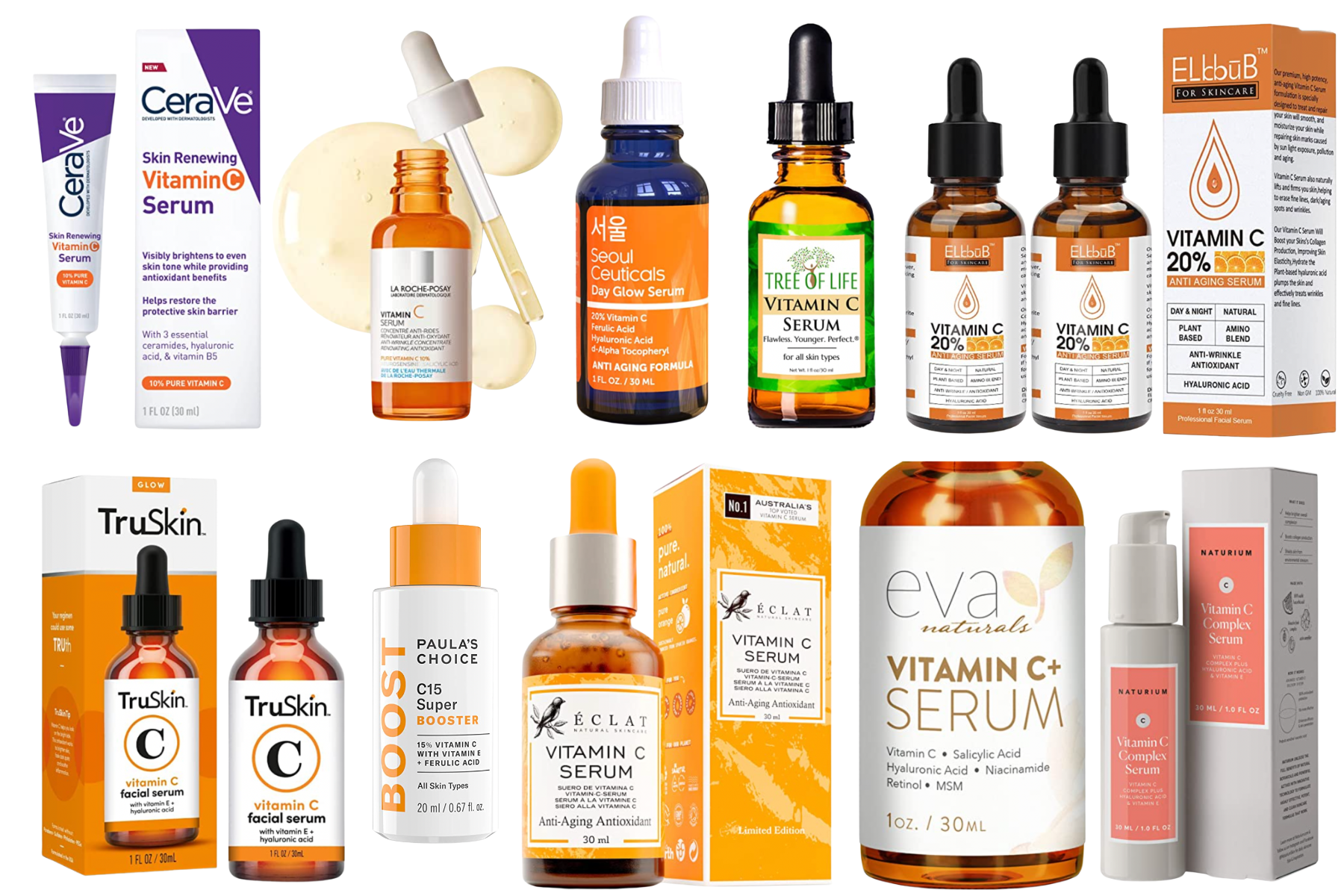You probably know that you should be using a Vitamin C serum in your skincare routine every day. If not, you’re about to learn.
Vitamin C is touted as one of the best ingredients on the market to slow the appearance of aging while maintaining a smooth, even, and glowy complexion.
Although you’re probably getting vitamin C in your diet, there’s no way to guarantee it’s going straight to your skin. Using serums and other topical products is the most direct way to reap these benefits.
Before I get into my favorite organic Vitamin C Serums, let’s discuss why and how you need to add this to your skincare routine.
Vitamin C VS Hyaluronic Acid
In a sentence, Vitamin C serum stimulates collagen production and works as an effective antioxidant. Hyaluronic acid moisturizes the skin. As you will see below, many of the best Vitamin C serums listed below include hyaluronic acid.
Going a little deeper (no pun intended) hyaluronic acid works to leave the skin looking plump. It also keeps skin hydrated and moisturized over time.
Vitamin C specifically works to protect the skin from sun damage and fades discoloration in the skin due to acne. (Personally, I love this.)
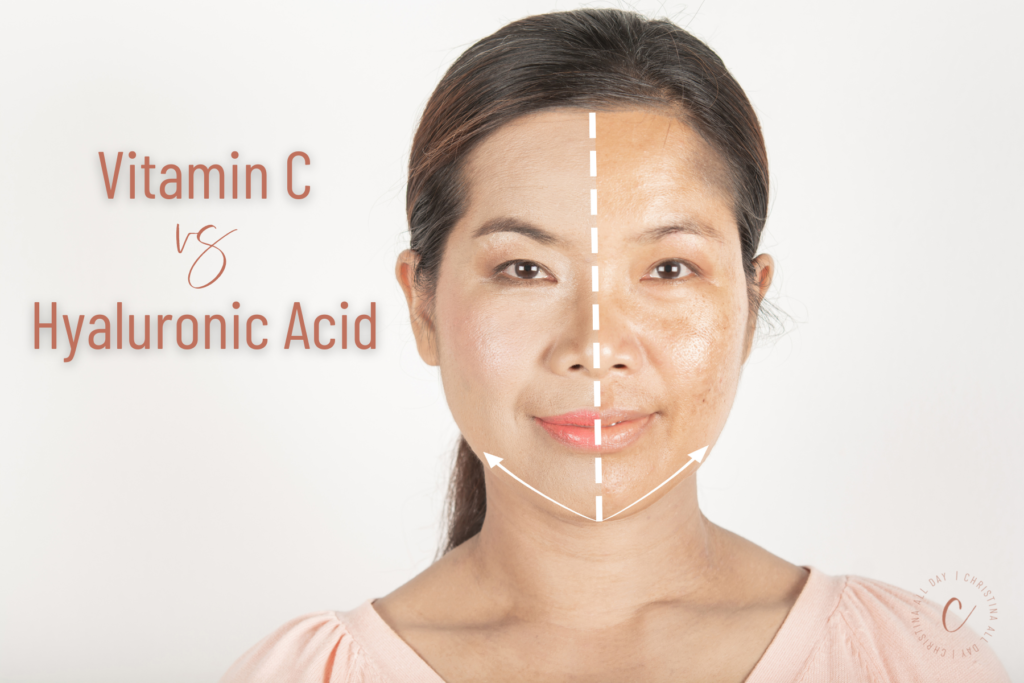
Not all powerful skincare ingredients can be mixed, but hyaluronic acid and Vitamin C are two that become even stronger when used together. These ingredients can provide both immediate and lasting results when used together.
So it’s really not a question of which one is better. It’s a question of: Do I use a Vitamin C serum with hyaluronic acid in the product, or purchase two separate products?
While this blog post is to help you choose the best Vitamin C serum for you, you will notice seven of the 10 serums listed below include hyaluronic acid. It’s a win-win!
How to use Vitamin C Serum
Although topical Vitamin C is generally well tolerated, all skin products have the potential to cause side effects. In addition, what works well for one person may not work well for you.
You should always do a patch test to see if you have any allergic reactions. Here’s how:
- Select a small area of skin that’s easy to conceal, like your forearm.
- Apply a small amount of product and wait 24 hours.
- If you don’t notice any negative side effects, you can apply it to your face following the instructions on the product’s label
Vitamin C serum is typically applied once or twice per day. A good rule of thumb is to cleanse, tone, apply Vitamin C serum, moisturize, and apply sunscreen. In this blog post, I share my favorite sunscreens for people who have melasma, like me.
The Benefits of Vitamin C
There are plenty of benefits to using Vitamin C on your skin, like:
- is safe for most skin types
- provides hydration
- can brighten your skin
- can reduce redness, hyperpigmentation, and the appearance of under-eye circles
- promotes collagen production
- may help prevent sagging, protect against sun damage, soothe sunburns, and assist in wound healing
Now, let’s break some of these down individually.
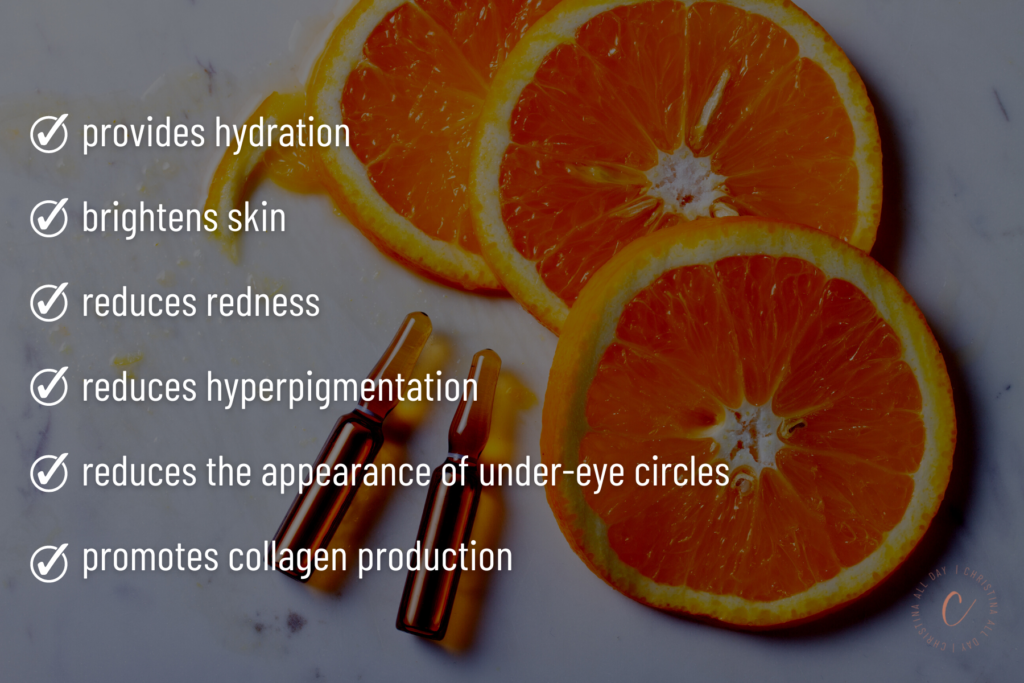
Vitamin C is Hydrating
Most healthy skin and organs contain high concentrations of Vitamin C.
Magnesium ascorbyl phosphate, another Vitamin C derivative used in skin care, has been shown to have a hydrating effect on the skin. It decreases transepidermal water loss (TEWL), allowing your skin to retain moisture better.
And yes, you should still use this (and moisturizer) even if you’re naturally oily.
Vitamin C is Brightening & Fades Hyperpigmentation
Vitamin C can help fade pigmentation (more on this below) and smooth the skin’s surface to reduce dullness. This gives skin a youthful glow.
It has been shown to impede melanin production. Melanin is the pigment responsible for skin color. By inhibiting melanin production, Vitamin C can help fade dark spots and hyperpigmentation.
Vitamin C is widely used in dermatology for reducing the pigmentation of hyperpigmented spots on the skin. It’s also been used to treat something called gingival melanin hyperpigmentation. This is when your gums look darker than they should.
Once you add Vitamin C to your skincare regimen, you may start seeing noticeable improvements in just three weeks but give it up to two months to see if the brand you’re using works.

Vitamin C Reduces Redness
This vitamin has also been shown to act as an anti-inflammatory agent through its antioxidant capacity, which means it soothes your skin and can reduce puffiness.
Vitamin C’s anti-inflammatory action may help:
- neutralize free radicals that cause oxidative damage
- optimize the immune system to discourage an inflammatory immune response
The anti-inflammatory properties of vitamin C can also help reduce redness. In turn, it can create a more even complexion.
The combined reduction of dark spots, redness, and irritation makes for a clear, smooth skin tone.
Vitamin C Reduces the Appearance of Undereye Circles
Vitamin C serums can help smooth out fine lines by plumping and hydrating the undereye area. Although Vitamin C is more effective at reducing overall redness (as mentioned above), some people say it can help alleviate discoloration associated with dark undereye circles.
Some other ways to help get rid of undereye bags include using a cold compress and adding retinol to your skincare routine.
The skin under your eyes is thin and sensitive. It’s best to stick to products specifically designed for the undereye area and apply them very lightly.
Vitamin C Promotes Collagen Production & Prevents Skin Sagging
Collagen is a naturally occurring protein that depletes over time. Lower levels of collagen can lead to fine lines and wrinkles.
Vitamin C is well known for boosting collagen production through the process of collagen synthesis. In fact, collagen synthesis can’t happen without Vitamin C, (but every little bit helps, right?!).
You can also boost collagen production through your diet. (That’s another blog post for another day.)

Vitamin C Protects Against Sun Damage & Soothes Sunburns
Excessive exposure to the sun or ultraviolet (UV) radiation is associated with depleted vitamin C levels in the skin.
Vitamin C is rich in antioxidants. Antioxidants protect healthy skin cells by “giving” free radicals that cause sun damage an electron, rendering them harmless.
The topical application of vitamin C, in combination with vitamin E and other compounds, has also been shown to reduce the side effects of sunburn.
Vitamin C Boosts Wound Healing
Given its effects on sunburn, it should be no surprise that topical Vitamin C application can speed up overall wound healing.
10 Best Organic Vitamin C Serum
TruSkin Vitamin C Serum with Hyaluronic Acid
Click here to buy TruSkin for $19.79.
ECLAT Vitamin C Serum
Click here to buy ECLAT for $9.99.
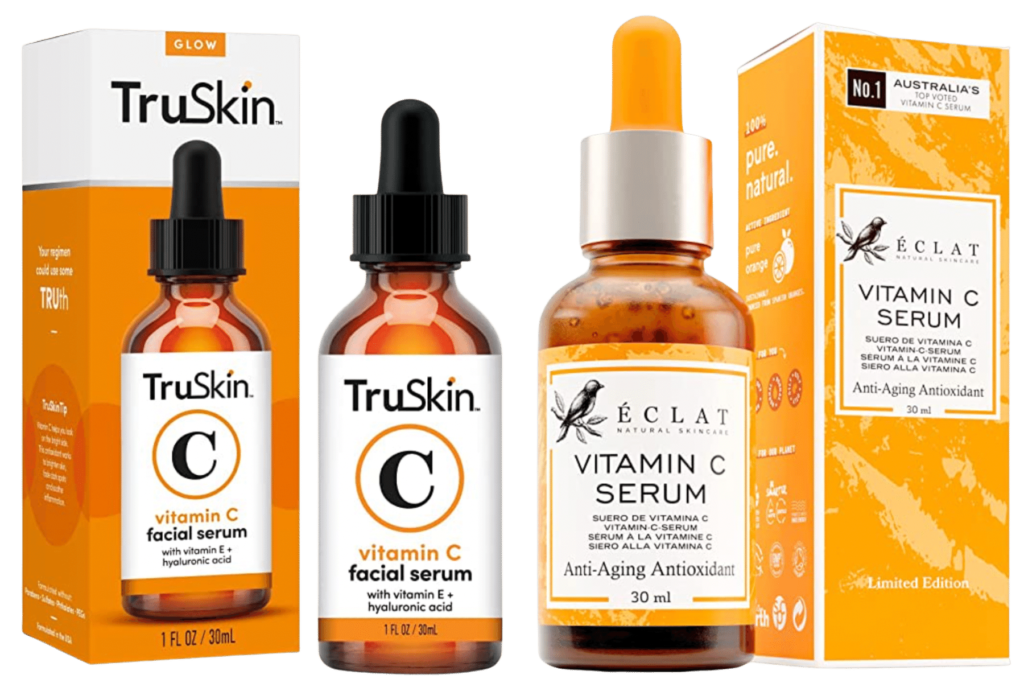
CeraVe Vitamin C Serum with Hyaluronic Acid
Click here to buy CeraVe for $20.82.
This one has more than 31,000 reviews with 4.5 stars on Amazon. CeraVe is a great brand many dermatologists recommend. Click here to learn more about CeraVe.
La Roche-Posay Vitamin C Serum with Hyaluronic Acid & Salicylic Acid
Click here to buy La Roche-Posay for $39.99.
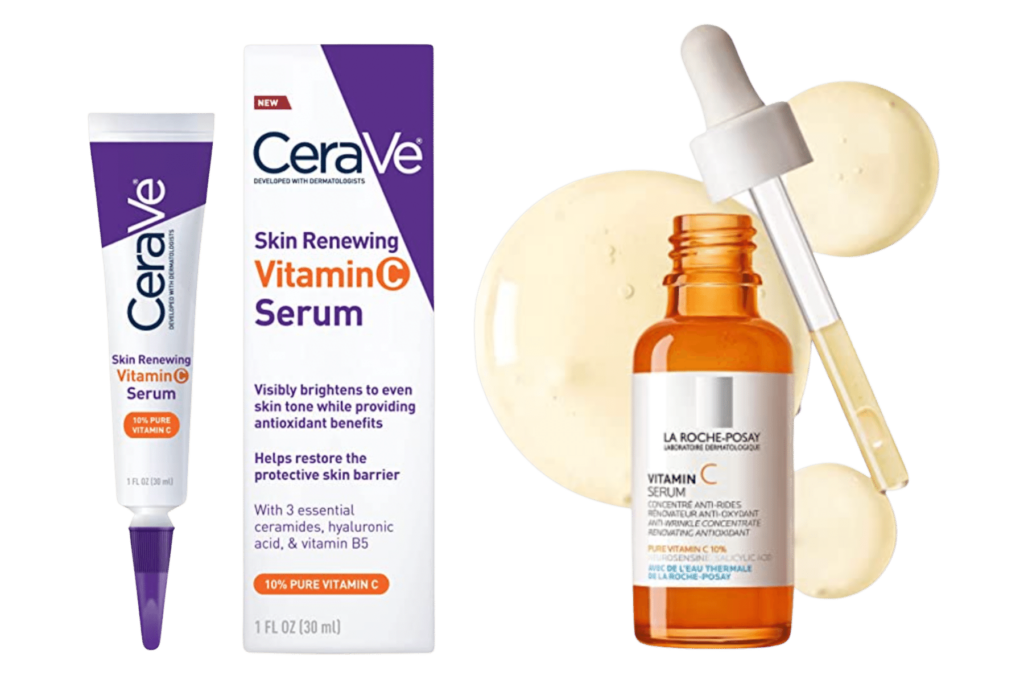
SeoulCeuticals Vitamin C Serum with Hyaluronic Acid Serum
Click here to buy SeoulCeuticals for $18.00.
Tree of Life Vitamin C Serum
Click here to buy Tree of Life for $13.49.
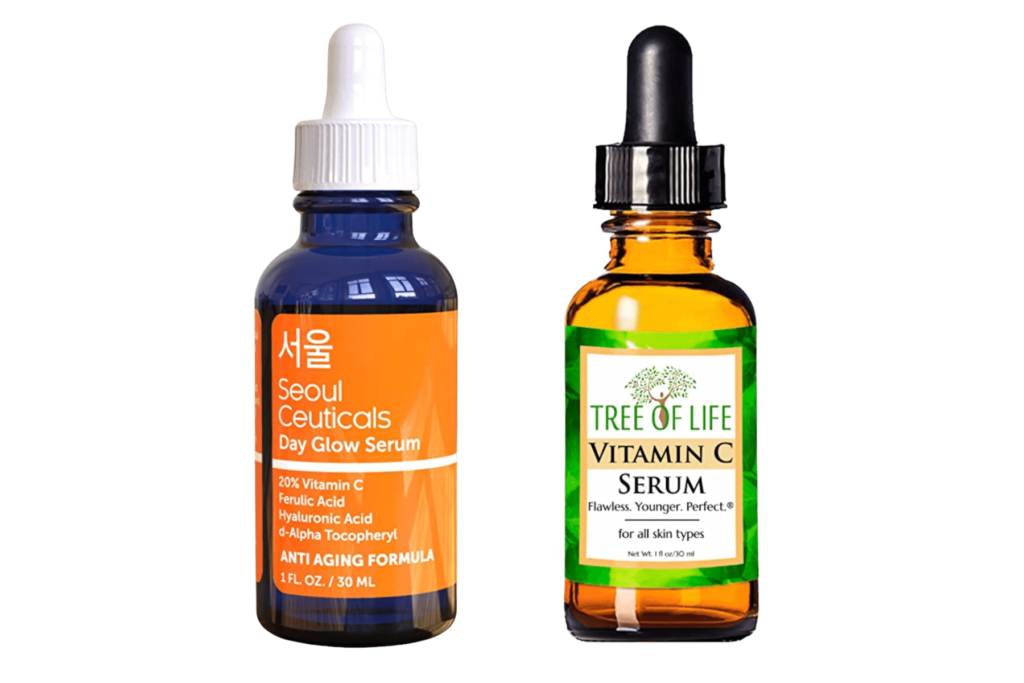
Naturium Vitamin C Serum with Hyaluronic Acid
Click here to buy Naturium for $18.05.
ELbbuB Vitamin C Serum with Hyaluronic Acid
Click here to buy ELbbuB for $13.09.
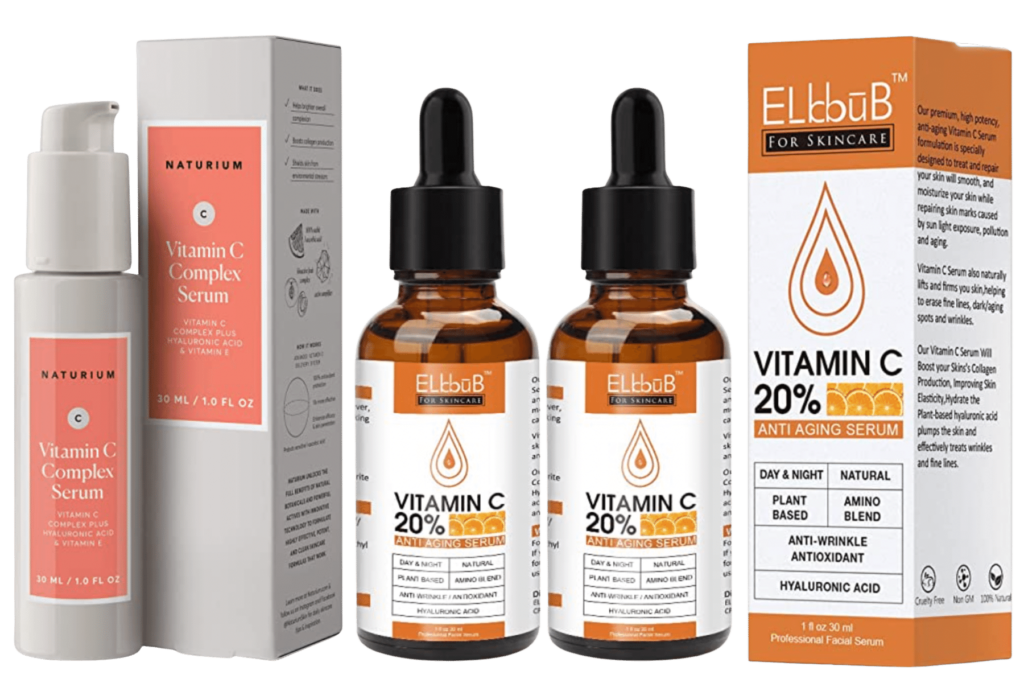
Eva Naturals Vitamin C Serum with Hyaluronic Acid Serum
Click here to buy Eva Naturals for $13.49.
This one has more than 50,000 reviews with 4.5 stars on Amazon. The highest in the bunch here!
Paula’s Choice Vitamin C Serum
Click here to buy Paula’s Choice for $52.25.
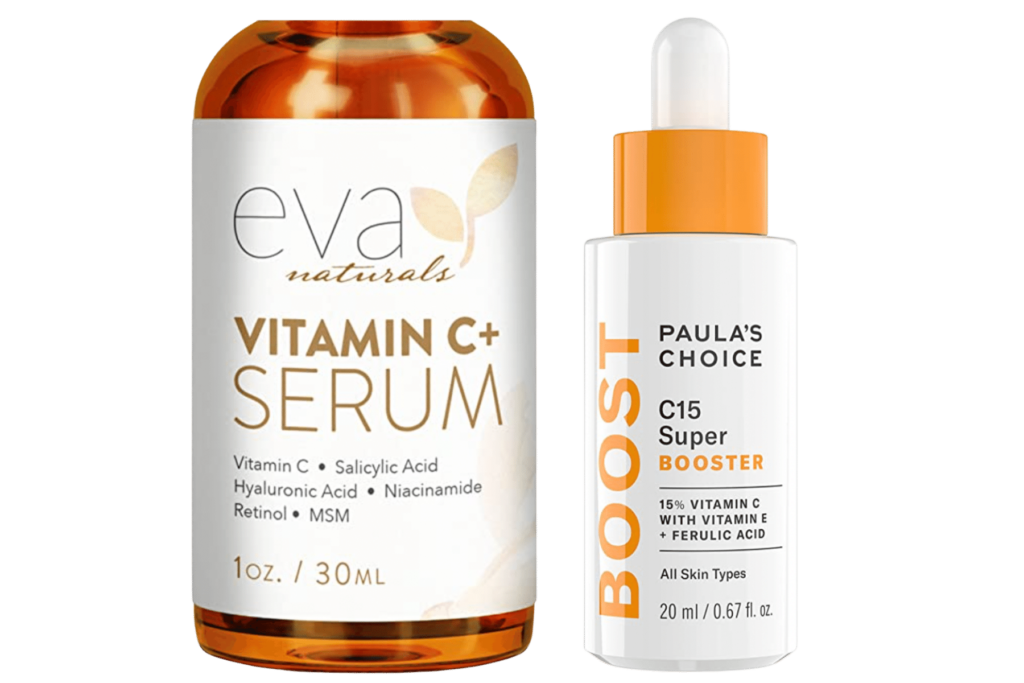
Do you use a Vitamin C Serum or hyaluronic acid not on the list? Find me on Instagram at @ChristinaAllDay and let me know.
